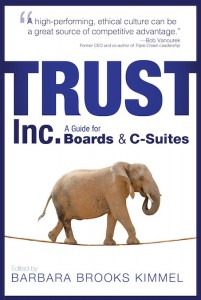A little secret…. do you know the single factor that impacts an organization’s bottom line more than any other?
Low trust.
It’s almost a guarantee that one of these is present in your organization and your bottom line is suffering as a result:
- Boards members don’t trust each other, nor do they trust the CEO
- Executives don’t trust themselves nor their management team
- Employees don’t trust their bosses and vice versa
- Consumers don’t trust the products to deliver what they say they will and they certainly don’t trust customer service to respond in any way that elevates trust
- Communities don’t trust the company not to pollute the local environment.
And so on…
Sound familiar?
Trustworthy organizations have a trust “edge” over their competitors, directly impacting profitability through:
- Faster decision making
- Speed of innovation
- Higher employee retention with better overall health and less stress
- Increased customer loyalty
- Long-term focus and less short-term pressure
- Fewer crises
- Improved hiring- people want to work for trustworthy employers
- Elevated reputation with all stakeholders
- Holistic organizational “wellness”
Contrary to what others may say or believe, the decision to lead with trust is always made at the top. When the leader lays it on the line that character and integrity matter more than short-term profitability, the entire organization shifts its long-term perspective and the way it “does” business. It’s up to the CEO to:
- First gain an understanding of what a trust strategy means across the entire organization (it’s not ethics or compliance) and how a trustworthy company should act.
- Communicate values loud and clear to all stakeholders- board of directors, employees, shareholders, vendors, suppliers, customers.
- Keep that word and promise ALWAYS. Live up to those espoused values. There’s nothing worse than a leader who “talks trust” but fails to walk it.
- Use communications channels to issue frequent reminders about the trust and integrity imperative in the organization.
- Become accessible- Roll up those sleeves, leave the ivory tower and go to talk to the people who make it possible to buy those custom-made shirts.
- Display excellence always. Nothing speaks “trust” louder than character, competence and consistency combined with a bit of generosity.
Companies that proactively build trust into their DNA see expenses decrease and profitability increase.
Not yet convinced? Take a moment to read this short article that makes the business case for trust from a research perspective.
Need more proof? This is an excellent summary of where we are today in corporate America and where we might be heading if we maintain the “low trust” status quo.
Lemmings tend to follow each other off cliffs. Those who choose a different path to profitability never get close enough to the cliff to worry about falling off.
Barbara Brooks Kimmel is the Executive Director of Trust Across America-Trust Around the World whose mission is to help organizations build trust. She runs the world’s largest membership program for those interested in learning more, and is also the editor of the award winning TRUST INC. book series and the Executive Editor of TRUST! Magazine. In 2012 Barbara was named “One of 25 Women Changing the World” by Good Business International.
Our 2015 Poster, 52 Weeks of Activities to Increase Organizational Trust is available to those who would like to support our work by making a small donation.
Copyright 2015, Next Decade, Inc.





Recent Comments